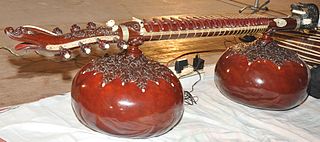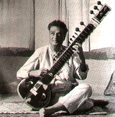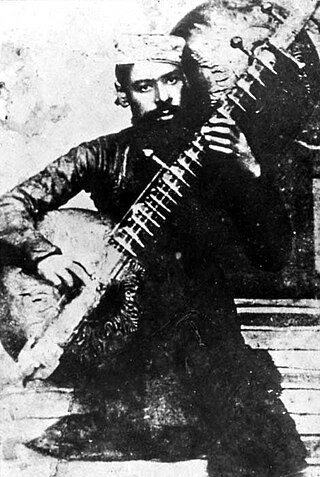Dhrupad is a genre in Hindustani classical music from the Indian subcontinent. It is the oldest known style of major vocal styles associated with Hindustani classical music, Haveli Sangeet of Pushtimarg Sampradaya and also related to the South Indian Carnatic tradition. It is a term of Sanskrit origin, derived from dhruva and pada. The roots of Dhrupad are ancient. It is discussed in the Hindu Sanskrit text Natyashastra, and other ancient and medieval Sanskrit texts, such as chapter 33 of Book 10 in the Bhagavata Purana, where the theories of music and devotional songs for Krishna are summarized.
Hindustani classical music is the classical music of the Indian subcontinent's northern regions. It may also be called North Indian classical music or, in Hindustani, shastriya sangeet. The term shastriya sangeet literally means classical music, and is also used to refer to Indian classical music in general. It is played on instruments like the veena, sitar and sarod. Its origins from the 12th century CE, when it diverged from Carnatic music, the classical tradition in South India. While Carnatic music largely uses compositions written in Sanskrit, Kannada, Telugu, Tamil, Malayalam, Hindustani music largely uses compositions written in Hindi-Urdu, Braj, Avadhi, Rajasthani, and Punjabi.

Ustad Amir Khan was an Indian singer and musician in the Hindustani classical tradition. He was the founder of the Indore gharana.
Zia Mohiuddin Dagar, , was a North Indian (Hindustani) classical musician, one of the 19th generation of Dagar family dhrupad musicians. He was largely responsible for the revival of the rudra vina as a solo concert instrument.
Kirana gharana is one of the Indian classical khyal gharanas, and is concerned foremost with intonation of notes (swara).

The Rudra veena —also called Bīn in North India—is a large plucked string instrument used in Hindustani Music, especially dhrupad. It is one of the major types of veena played in Indian classical music, notable for its deep bass resonance.

The Mewati gharana is a musical apprenticeship tribe of Hindustani classical music. Known for being Pandit Jasraj's musical lineage, the gharana was founded by brothers Ghagge Nazir Khan and Wahid Khan (beenkar) of Indore in the late 19th century at the Holkar Court. Members of this gharana have had an active influence in Indian cinema for over half a century.
Zia Fariduddin Dagar was an Indian classical vocalist belonging to the Dhrupad tradition, the oldest existing form of north Indian classical music. He was part of the Dagar family of musicians.
Ustad Abdul Wahid Khan (1871–1949) was an Indian subcontinental singer from the Kirana gharana. He died in 1949 in Saharanpur, India.
Mushtaq Ali Khan and was an Indian classical sitar, surbahar player.

Asad Ali Khan was an Indian musician who played the plucked string instrument rudra veena. Khan performed in the style dhrupad and was described as the best living rudra veena player in India by The Hindu. He was awarded the Indian civilian honor Padma Bhushan in 2008.
Ustad Nissar Hussain Khan was an Indian classical vocalist from the Rampur-Sahaswan gharana. He was a disciple and son of Fida Hussain Khan and after a long and illustrious career was awarded the Padma Bhushan in 1971.

Abdul Halim Jaffer Khan was an Indian sitar player. Khan received the national awards Padma Shri (1970) and Padma Bhushan (2006) and was awarded the Sangeet Natak Akademi Award for 1987.
Rahim Fahimuddin Dagar was an exponent of Dagar vani Dhrupad of Indian classical music. He represented the 19th generation of Dagar Tradition. His cousins Nasir Moinuddin Dagar and Nasir Aminuddin Dagar were known as the Senior Dagar Brothers. Similarly, Nasir Zahiruddin and Nasir Faiyazuddin Dagar were known as the Junior Dagar Brothers. His other cousins were Zia Mohiuddin Dagar, Fariduddin Dagar, and H. Sayeeduddin Dagar.
Mohammad Sharif Khan known as Ustad Sharif Khan Poonchwaley was a classical player of sitar, vichitra veena and raza been in the hindustani classical music tradition.
Ram Chatur Mallick (1902–1990) was an Indian classical musician and an exponent and founder to the outside world of the Darbhanga gharana of the Dhrupad tradition, one of the oldest genres of Hindustani vocal music. Known to be the last main court musician at the court of The Darbhanga Royals, following his immediate & direct ancestors from the last 14 generations and one of the closest to the King of the Dharbanga Maharaja Sir Kameshwar Singh, he also was the closest ADC to his highness and responsible for all music related activities on behalf of the King and King's brother, he was a member of the Mallick family of singers. He was honoured by the Government of India in 1970 with Padma Shri, the fourth highest Indian civilian award.
Carsten Wicke is a Rudra Veena player of German origin who lives in India. He studied North Indian classical music with several master musicians since the 1990s, after learning western violin and vocal music as a child.
Wahid Khan, more commonly known as Wahid Khan Beenkar or Indorewale Wahid Khan, was an Indian classical rudra veena player and, along with his younger brother Ghagge Nazir Khan, founded the Mewati gharana, later popularized by Pandit Jasraj and Rais Khan.
Nasir Moinuddin Dagar was a Hindustani classical dhrupad singer from India, part of the Dagar gharana. He and his younger brother Nasir Aminuddin Dagar performed together, and are best known as the Senior Dagar Brothers.

Bande Ali Khan, more commonly known as Ustad Bande Ali Khansaheb or Bande Ali Khan Beenkar, was an Indian classical rudra veena player. Known for being the most historically celebrated exponent of the been, Khan was an ancestor to major contemporary Hindustani Classical music gharanas including Indore, Mewati, Kirana, and Dagarbani.








